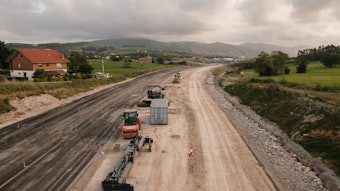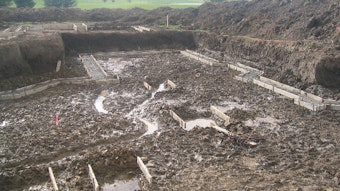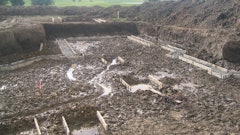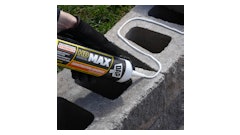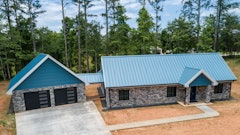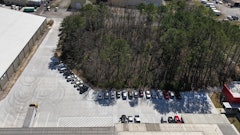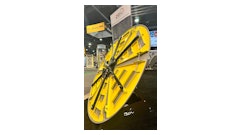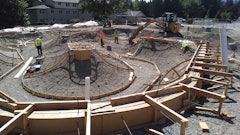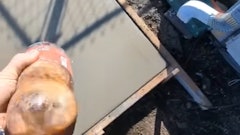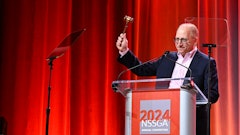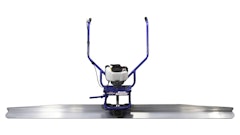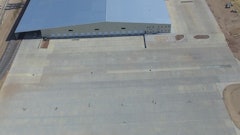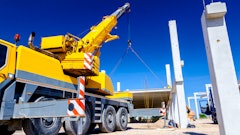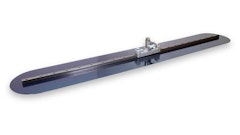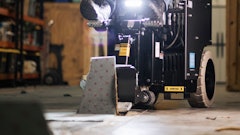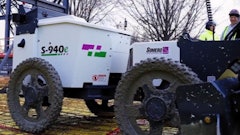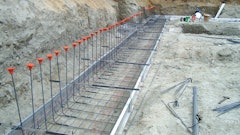
For nearly 40 years, MPW Construction Services has worked in northern Ohio as a residential concrete contractor. Over time the company added flatwork, excavation, site work, demolition and waterproofing services to its footings and foundations expertise. Several years ago, President Scott Smith wanted to expand the company further. “We were 90 percent residential, and we wanted to grow and diversify,” Smith says.
In 2005, Smith got his leadership team together and asked them if the company could succeed in the commercial realm. At that time, MPW only took on commercial projects that came to them. Smith saw a commercial focus as a growth opportunity.
With the support and talent of his company’s leadership team, MPW made the decision to pursue more commercial projects. “We proved the importance of making this change the very next year when the residential market started to fall,” Smith adds.
While the early years of the venture produced the same pressures and pains most contractors feel when they add a new service, MPW made the transition with a balanced mix of caution and confidence. The result positioned the company in a niche that keeps them busy and sets them apart from the competition. The company will close out 2013 with a 60 percent residential/40 percent commercial split. “During the housing depression our sales volume fell 70 percent. We went from 200 employees to 60. It was often scary and financially painful to stick with our decision to enter a new market. Now we are really glad that we remained faithful to our plan even when the going was really rough,” Smith says.
Going after commercial
The foray into commercial work was a natural step for MPW. Smith says the company’s experience in complex, custom residential foundation projects prepared it well for commercial construction. Additionally, MPW crews had been performing residential flatwork and excavation along with the occasional commercial project for many years.
The company had a relatively low cost for entry into the commercial market since it owned the majority of necessary equipment to perform small excavation jobs, foundations and flatwork. The most important investment MPW made was adding a sales person who was focused on securing commercial jobs.
MPW experienced both good and bad in the first few years. There were zero margin results mixed with jobs of a new scale that were successful.
It was during the downturn when MPW established a relationship with a developer that resulted in a series of multi-family projects along the Rocky River community west of Cleveland. Smith recalls reading a local business magazine about the first project, saw the artist’s renderings showing the buildings perched on the banks of the Rocky River, and read the magic words – that the project was “financed.” Smith says, “In 2008, that was a big deal. I knew that project would happen. I told my commercial estimator to make a contact with the project owner.”
As it turned out, the builder needed excavation, foundation and flatwork for a five-building, 30-unit project they were getting ready to build. “Our experience with foundations helped the contractor as we value engineered the project with them. That assistance, competitive pricing and execution on the first project helped us capture the much more difficult and larger projects along the Rocky River," Smith explains.
The first riverside project, called Eleven River, consisted of 11 units in two buildings. It was complex and futuristic in design. The foundations were all on pilings and grade beams on a cramped site. The story line from MPW's first project with the developer repated itself at Eleven River. MPW was able to assist with practical suggestions to save time and money. And most important the project was completed on time and within budget. The Concrete Foundations Association (CFA) recognized MPW for its work with at Eleven River with a 2012 Project of the Year award in the commercial/multi-family category. MPW was again awarded the CFA’s Project of the Year award in 2013 for its entry of Clifton Pointe, a three-building, 17-unit development on a ½-acre site perched more than 100 feet over the Rocky River for the same riverside developer.
Commercial success
Diversification wasn’t new to MPW, which built a lineup of services to fill the needs of its residential customers. Its venture into commercial was a little more challenging. First, they had to build new relationships with new customers. Second, they needed to learn the nuances of a new market.
Smith says early on his team recognized the need for detailed job costing. “With residential projects, I can walk up on a job and tell you if we are going to make money or not. You can’t do that with commercial work. There are too many things going on and the projects extend over a much longer time frame,” he says. “It’s very important to job cost commercial work. We were very diligent with that process. We didn’t want to risk untracked losses on a long running commercial job to surprise us or even bankrupt our residential business.”
Over time, Smith says the MPW leadership team recognized further differences between the two markets. '“We find commercial jobs are more organized. A GC wants you to hit your schedule and build what’s on the blueprints, and they recognize the importance of the subcontractor having accurate information up front,” he explains. “We also find that getting work in the commercial world is very much about the bottom line number. While price is very important in the residential world as well, we usually have the opportunity to sit down with a residential customer and help them see why hiring MPW is better for them even if the total price seems higher. In commercial, most of our bids are submitted by email and we may never hear from them about that job again.”
The first four years of MPW’s commercial venture was a development phase. During that time the residential side of the business supported the commercial side, both through revenue and manpower. But eventually MPW saw its commercial workload and margins grow. To better service customers and internal needs, MPW split its staff into separate residential and commercial crews. “We’ve gotten more efficient at commercial work and have enough to choose from that we don’t have to take jobs just to stay busy,” Smith adds.
That success came as MPW discovered a niche. “We service a middle market," Smith explains. "We focus on jobs that are too small for big guys and too big for the really small guys. While the larger contractors chase multi-million dollar jobs, we chase multi-hundreds-of-thousands-of-dollar jobs.” The company’s complementary services like demo and site development up to 4 acres further increase its appeal over competition.
Smith gives a lot of the credit for his company’s success to his employees. “I think one thing our success can be attributed to is our culture of willingness to let our young decision makers have a lot of autonomy and authority. Sometimes there are mistakes, but I look at them as an opportunity to learn and do better next time,” Smith says. “It’s a personal pleasure for me to see my employees take on challenges and succeed. It’s one of the reasons I come to work every day.”
Confidence in his employees allowed Smith to take the risks the company needed to take in order to grow. “We have stretched ourselves, winning work we were not sure how to do — then figured out how to get it done. And we have walked away from some really interesting opportunities when we agreed we weren’t ready for that level of difficulty — yet,” he explains.
“Lucky for us, we have great employees who know how to build things,” he continues. “The commercial work was just another kind of building. You build everything one square foot at a time, and as you develop you land bigger jobs and build bigger buildings. You can only achieve these records one job at a time.”
Hyland Software
MPW’s work at Hyland Software is a recent example of the company’s success in the commercial realm. The project entails turning an old health club into office space for a software company. MPW’s scope of work includes demo on two indoor asphalt tennis courts (each ½+ acre), column footings to support two new mezzanine levels, place and finish of five slabs, concrete repair, and 4 acres of site work.
The project started with the removal of the asphalt tennis courts. Crews crushed the asphalt and used it as fill for two swimming pools that were on the property. In place of the two-story asphalt tennis courts, the GC crews built two mezzanine decks. MPW’s crew poured footings for nearly 200 steel column supports for the mezzanine decks. Each column footing required helical piers and six anchor bolts poured in place, each accurately installed with the help of MPW’s robotic total station.
MPW placed and finished five slabs on the project, each about 26,000 square feet in area. The mezzanine decks were placed with lightweight concrete, 3-1/4 to 5-1/4-inch thick. The strategic use of rebar and wire mesh reinforcement minimized cracking on floors that were specified without sawcuts. The three main floor slabs were each 4 inches thick, constructed with 4,000 psi concrete and reinforced with wire mesh. MPW also performed the site development, including two bio-retention basins, parking lot excavation and all exterior concrete.
Looking ahead
While MPW’s commercial venture put the company on a growth trajectory, its residential side has seen changes too. The depression in the housing market crushed numerous competitors. But often employees of these former competitors bought equipment from their failing owners at auction and entered the market with lower overhead. In a time when work was almost always decided on price, MPW worked to tighten efficiencies and stay competitively priced. “At the same time, we managed to not have to be low bid all the time. Some companies don’t want headaches; they want us,” he says.
Additionally, the building downturn transformed the landscape of the residential building market in greater Cleveland. Today, big regional or national builders control about 70 percent of new home building in the area. MPW changed along with the market and today focuses on opportunities to utilize its expertise in building complex, custom foundations, while continuing to help larger builders where doing so is good for both companies.
As Smith looks to the future for MPW, he sees a company with a healthy balance between commercial and residential projects. “We will try to grow both sides of the business, but there are more opportunities in commercial work,” Smith explains. “The company might end up with a 50/50 revenue split, or even a little more commercial work in the next few years.”
Whatever the split might be, the company's diversification into commercial work will help is stay strong and weather the fluctuations of the construction economy for years to come.

